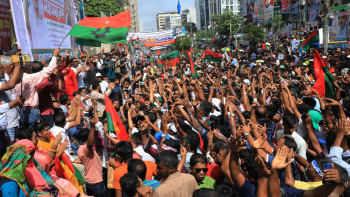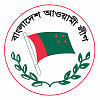Did BNP make the wrong call?

Last December, BNP managed to create a strong momentum with successive divisional rallies, defying obstacles from the ruling party cadres and law enforcement agencies. But it lost that momentum when it tried to hold a rally in Dhaka. Since then, the party – which has been out of office for more than 16 years – has been trying to regain that thrust. This time around, BNP held a series of programmes around Dhaka and got some traction thanks to its supporters, leading up to its grand rally of July 28. The party was also able to hold the rally at its preferred venue, in front of its Nayapaltan headquarters. Tens of thousands of BNP workers joined in, defying myriad odds and obstacles. It turned out to be a mammoth rally and, encouraged by the turnout, BNP announced sit-in programmes at five entry points of the capital the very next day, presumably to cut off Dhaka from the rest of the country for several hours between 11am and 4pm. But the sit-in failed in the face of the ruling party's strong presence on the street and the aggressive attitude of the police. And again, BNP lost its momentum.
Since then, a few questions have been circulating in political circles: why did BNP go for such a programme? What did it achieve? And what will the party do now that the national election is just a few months away?
After the announcement of BNP's one-point demand – resignation of the ruling government for a caretaker government to oversee elections – movement on July 12, the party took only 16 days to announce the sit-in demos. Coordination among the party fronts and associate bodies, which requires time, is imperative to make such ambitious programmes successful, but there seems to have been a lack of coordination among BNP leaders in this regard. Even some of the party's senior leaders were in the dark about these programmes till they were announced. The decision of a sit-in demo of such a scale, without much time on its hands, indicates that BNP was in a hurry.
There is no denying that the party has a strategy in place to achieve its goal of the next election being held under a nonpartisan, election-time government. But it seems that the plan may not be as well thought out as BNP supporters would like. The party's leadership felt charged up seeing the large-scale turnout in the rally, but they underestimated the government's strength and strategic abilities. This explains why BNP couldn't succeed entirely in its programme, and now seems to have backtracked from its tough stance. After the sit-in, the party announced demos in districts and cities across Bangladesh, which is a deviation from its Dhaka-centric plans. The lack of coordination and confidence in terms of holding large rallies and showdown-like programmes can demoralise grassroots BNP supporters, who are paying a high price for the erroneous judgement calls of the party's top brass.
For the longest time, BNP has argued that the government and law enforcement agencies are obstructing their peaceful rallies, and the events which unfolded on July 29 has once again lent credence to their clams. The attack by ruling party men, in the presence of the law enforcement agencies, has laid bare just how "democratic" the government will be in the lead up to the elections. Of course, some BNP men did engage in violent activities during the sit-ins, but the previous programmes of BNP were largely peaceful, despite instigations. Either way, BNP knows that any violence from its own party will eventually work against itself. And this time, the party is being careful as it was accused of conducting arson attacks in 2013 and trying to sabotage the January 5, 2014 election.
Back in 2013, the party did not come up with alternative strategies when they saw that the blockades were not working. At least this time around, they have backtracked from their plans and proposed an alternative when they realised that the sit-in had failed. This could be interpreted as the party being more mature and wiser in its current decisions.
BNP's real loss in all this was giving the upper hand to the ruling party. There was no doubt that the ruling party felt pressure, especially after the composed and largely organised grand rally. But the following day, when ruling party cadres were able to easily disperse the BNP demonstrators, it worked like a morale-boosting tonic for the former. They felt more confident about being on the streets and not giving anything away to the BNP. This was essential for the Awami League at a time when it seemed to be under pressure from different directions to hold a free and fair election. Now it remains to be seen whether BNP can once again revive their momentum and give the ruling party a run for their money.
Mohammad Al-Masum Molla is chief reporter at The Daily Star.

 For all latest news, follow The Daily Star's Google News channel.
For all latest news, follow The Daily Star's Google News channel. 











Comments